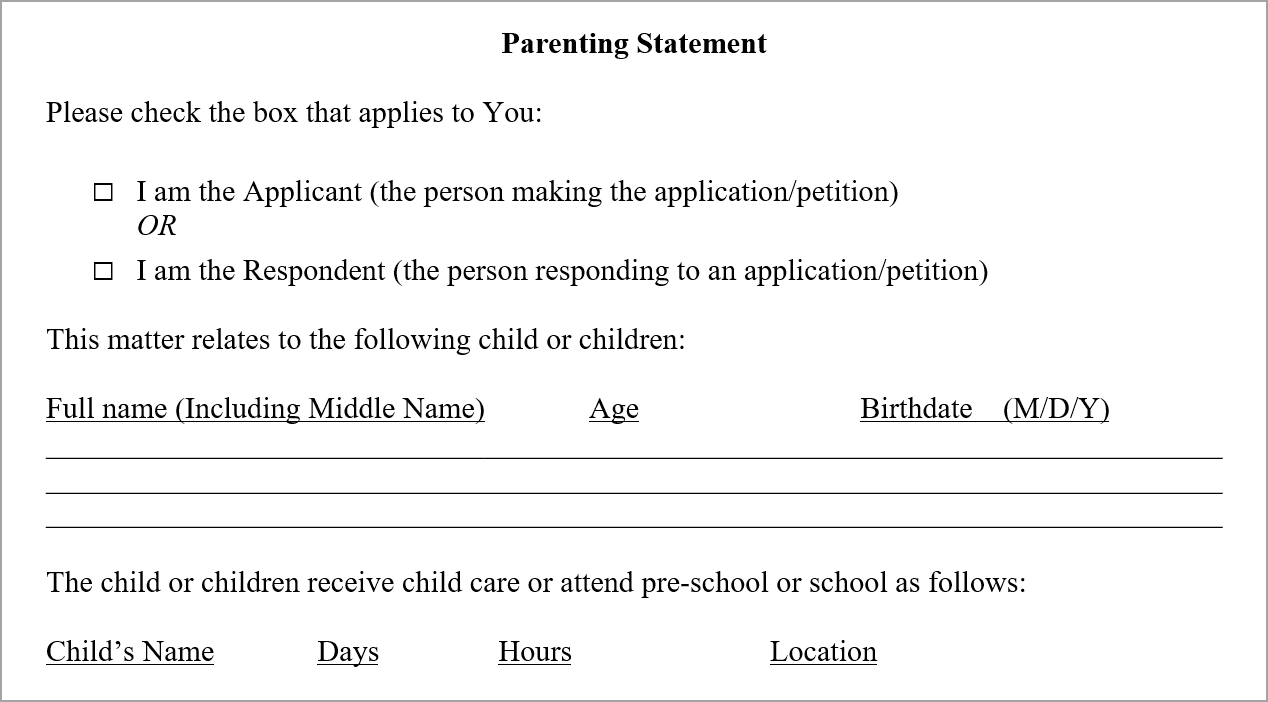Nova Scotia Parenting Plans (Custody Agreements)
Parenting plans give you structure when you're parenting apart. They provide the details of your parenting arrangements.
What to expect
If you can't agree on a parenting plan, you must each submit a proposal to the court. The judge will consider your proposal when making a final decision.
If you agree on a parenting plan and aren't divorcing, you don't have to go to court. But you can register your plan so that it is enforceable like a court order.
If you're divorcing, your parenting plan will be part of your final divorce order.
Parenting plan templates
If you agree on parenting arrangements, you can use any template you'd like. The Government of Canada's parenting plan tool covers the basics of a parenting plan. To create a more detailed plan, consider the Custody X Change parenting plan template, which suggests more than 140 common provisions.
 Try this with Custody X Change.
Try this with Custody X Change.
If you disagree on parenting arrangements, you must use Nova Scotia's parenting statement (Word download). You'll write in where your child lives and the parenting time schedule you currently follow. Then, you'll propose an arrangement you believe would be best for your child.

You can combine any other parenting plan template with the parenting statement.
Required elements
The only required element of a parenting plan is parenting time. However, you must include decision-making authority and information sharing if you'll have special terms for them.
Parenting time is the time children spend with their parents. Include whose home the child will mostly live in, then set out a written schedule for the other parent's time. If each parent will have at least 40 percent of parenting time, you can specify parenting time for both of you.
Decision-making authority is the right to make major decisions on the child's behalf, like which school they will attend. By default, both parents have equal decision-making authority. If you'd like to split authority differently, you must specify how. For example, one parent can make all decisions or you can divide decisions by category (e.g., education).
By default, parents have a right to access child-related information like report cards and medical records. If one parent won't have access to some or all this information, you must say so in your parenting plan.

Optional parenting plan provisions
Co-parenting is all about cooperation. Include rules for other aspects of parenting to help you maintain order and avoid disagreements. The following are some of the topics you can cover.
Transitions
How will the child get from one parent's home to the other? Will you meet in a neutral location? Will you pick up the child from one another's homes?
Schedule disruptions
It's not always possible to follow your schedule. Detail what you'll do if a parent cannot exercise their parenting time. For example, specify whether there will be make-up time. As another idea, you can say that a parent must notify the other parent if they arrange for a babysitter.
Communication
You may need to contact the other parent to discuss child-related matters. How can parents get in touch with one another? By phone? Email? Text? You can include limitations on how often you may contact one another and more.
Interaction time
Interaction time covers time spent with a child indirectly. This includes phone calls, video calls and attending the child's extracurricular activities. Make it clear who will have interaction time and how they may interact with the child. Interaction time may be for a parent or other people close to the child.
Contact time
If a third party such as a grandparent will have regular visits with the child, specify when and how often in your parenting plan.
Activities
Consider specifying how parents will share the responsibilities that come with your child's regular activities — for example, making sure the child has transportation to sports practice. You could also cover whether parents will always attend the same events or take turns.
Travel
Set ground rules for taking the child on trips such as:
- How much advance notice a parent must give
- If you must share a full itinerary with the other parent
- Whether the child can take a flight alone
- Whether parents must consult one another before getting the child a passport
Changes to your plan
Your family's circumstances will change over time. Consider setting up regular reviews of your parenting plan to discuss potential changes. Also, state how you will propose changes. Must you negotiate in writing to keep a paper trail?
The easiest way to make a parenting plan
When you're writing a parenting plan, it's critical you use airtight language that leaves no room for interpretation.
If you hire a lawyer, they'll write up the plan and ensure it meets the court's requirements.
If you write your own plan, use technology to take guesswork out of the equation. The parenting plan template in the Custody X Change online app walks you through each step.

The result is a professional document that demonstrates your competence as a parent from the first glance.
The easiest and most reliable way to make a parenting plan is with Custody X Change.
